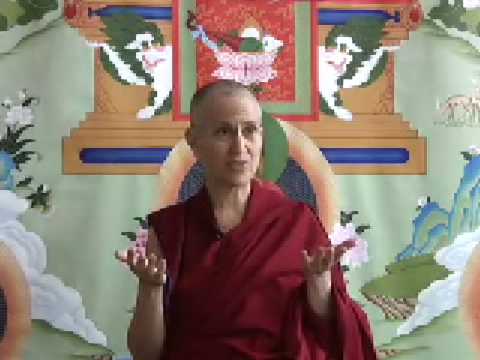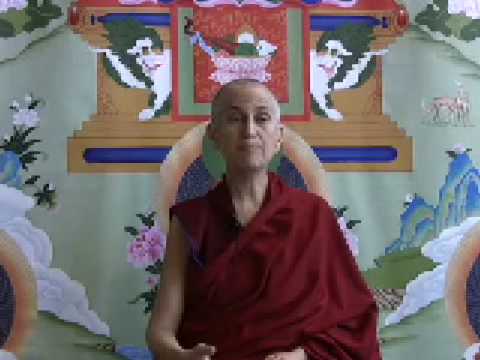Resources for fearful scenarios
A series of talks on the many aspects of of our lives that we may have fear towards—death, identity, the future, health, the economy, loss, separation, and more; touching also on the wisdom of fear and the different antidotes to ease our fears.
- We do need to think about the future, but in a realistic way
- We always have choices, even in bad situations
- Thought training techniques help us bring difficulties into the path and learn from them
Fear 08: Resources for fearful scenarios (download)
Okay so, yesterday I was talking about how our mind does a lot of creative writing in doing the worst case scenarios, of all the fearful things that are going to happen and how we create fear within our self, envisioning things in the future that may or may not happen, and being sure that they’re going to happen and then getting ourselves all worked up into a state about it. Okay so, yesterday I talked about how it’s not necessary to project into the future that way and write those stories, but bring ourselves back into the present.
But then also, I was saying that we do need to think about the future and think of things that could happen so that we prepare for them, because if we don’t prepare for things then we are totally caught off guard. So for example, that’s why we do the meditation on impermanence and death, because when thinking about death that will inspire us to prepare for it, okay? But here we’re prepared for it without that panicky fear, but instead with wisdom, okay?
So, what fear does when it writes the fearful scenarios is it says that there’s absolutely nothing I can do, these circumstances are going to overpower me and therefore I don’t even wait for them to happen, I feel miserable right now. Whereas, it’s very productive to remember that we always have choices, even in bad situations, and that, there are always resources around us to which we can turn for help. So in any situation there’s likely to be external resources; if we get sick there are hospitals and doctors and health care professionals, there’re friends to take care of us, there’re treatments to take, there’s medicine, there’s so much that can happen. If we’re in a difficult financial situation there’s the external things, there’re people who will help us through the difficulty and whatever. And there’re also things we can do. For example in financial difficulties we can stop wasting money on buying things we don’t need, which we actually should’ve done as a country a few years ago; it would’ve saved us a lot of misery. So there’re things that we can do, re-adjust our living style and be just as happy. And there’re also internal things that we can do, internal resources that we have that we can use to deal with bad situations.
Thought training
And this is where the thought training practice happens. And so, we change the state of mind we’re in, we instead of getting angry and blaming outside we see this as a ripening of karma and thus rejoice, okay? Or, we use the difficulty to think of people who are in situations that are far worse and develop compassion. We use the problem to remind us of the nature of samsara and thus to generate renunciation and the determination to be free. And so, all these mental resources that we have also change our experience of the situation, okay? So whereas when we have fear, worry and anxiety we don’t see any choices, in actual reality there’re many choices. Either in terms of the environment, in terms of our own actions, in terms of how we view the situation and transform the experience through our Dharma practice. So if we think of things, difficulties that we could encounter in the future, instead of having this panicky fear and worry, then to think of the resources that we have at our fingertips.
And if we don’t have as many resources as we would like, for example if our thought training practice isn’t as strong as might be needed to deal with some difficulty in the future then now we need to practice thought training with more energy and more commitment, okay? So we don’t just kind of do the “mañana a la mañana” thing of, you know, I’ll deal with it when I come to it and so therefore I won’t train my mind now and then expect to be able to practice Dharma at the instant that we need it. But rather, we really exert ourselves to practice now, transforming our mind now and in the process of doing that we start to purify the karma that could cause some of those bad situations. So, I’ll talk a little bit more about that, about how karma fits in with fear and bad situations tomorrow, and what we can do about that.
Venerable Thubten Chodron
Venerable Chodron emphasizes the practical application of Buddha’s teachings in our daily lives and is especially skilled at explaining them in ways easily understood and practiced by Westerners. She is well known for her warm, humorous, and lucid teachings. She was ordained as a Buddhist nun in 1977 by Kyabje Ling Rinpoche in Dharamsala, India, and in 1986 she received bhikshuni (full) ordination in Taiwan. Read her full bio.


